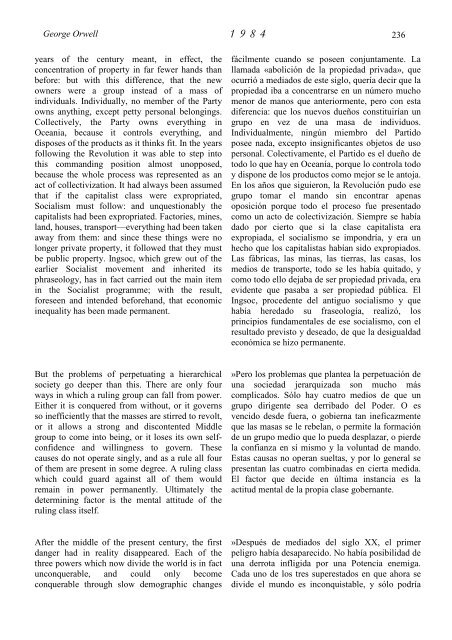You also want an ePaper? Increase the reach of your titles
YUMPU automatically turns print PDFs into web optimized ePapers that Google loves.
George Orwell 1 9 8 4<br />
years of the century meant, in effect, the<br />
concentration of property in far fewer hands than<br />
before: but with this difference, that the new<br />
owners were a group instead of a mass of<br />
individuals. Individually, no member of the Party<br />
owns anything, except petty personal belongings.<br />
Collectively, the Party owns everything in<br />
Oceania, because it controls everything, and<br />
disposes of the products as it thinks fit. In the years<br />
following the Revolution it was able to step into<br />
this commanding position almost unopposed,<br />
because the whole process was represented as an<br />
act of collectivization. It had always been assumed<br />
that if the capitalist class were expropriated,<br />
Socialism must follow: and unquestionably the<br />
capitalists had been expropriated. Factories, mines,<br />
land, houses, transport—everything had been taken<br />
away from them: and since these things were no<br />
longer private property, it followed that they must<br />
be public property. Ingsoc, which grew out of the<br />
earlier Socialist movement and inherited its<br />
phraseology, has in fact carried out the main item<br />
in the Socialist programme; with the result,<br />
foreseen and intended beforehand, that economic<br />
inequality has been made permanent.<br />
But the problems of perpetuating a hierarchical<br />
society go deeper than this. There are only four<br />
ways in which a ruling group can fall from power.<br />
Either it is conquered from without, or it governs<br />
so inefficiently that the masses are stirred to revolt,<br />
or it allows a strong and discontented Middle<br />
group to come into being, or it loses its own selfconfidence<br />
and willingness to govern. These<br />
causes do not operate singly, and as a rule all four<br />
of them are present in some degree. A ruling class<br />
which could guard against all of them would<br />
remain in power permanently. Ultimately the<br />
determining factor is the mental attitude of the<br />
ruling class itself.<br />
After the middle of the present century, the first<br />
danger had in reality disappeared. Each of the<br />
three powers which now divide the world is in fact<br />
unconquerable, and could only become<br />
conquerable through slow demographic changes<br />
236<br />
fácilmente cuando se poseen conjuntamente. La<br />
llamada «abolición de la propiedad privada», que<br />
ocurrió a mediados de este siglo, quería decir que la<br />
propiedad iba a concentrarse en un número mucho<br />
menor de manos que anteriormente, pero con esta<br />
diferencia: que los nuevos dueños constituirían un<br />
grupo en vez de una masa de individuos.<br />
Individualmente, ningún miembro del Partido<br />
posee nada, excepto insignificantes objetos de uso<br />
personal. Colectivamente, el Partido es el dueño de<br />
todo lo que hay en Oceanía, porque lo controla todo<br />
y dispone de los productos como mejor se le antoja.<br />
En los años que siguieron, la Revolución pudo ese<br />
grupo tomar el mando sin encontrar apenas<br />
oposición porque todo el proceso fue presentado<br />
como un acto de colectivización. Siempre se había<br />
dado por cierto que si la clase capitalista era<br />
expropiada, el socialismo se impondría, y era un<br />
hecho que los capitalistas habían sido expropiados.<br />
Las fábricas, las minas, las tierras, las casas, los<br />
medios de transporte, todo se les había quitado, y<br />
como todo ello dejaba de ser propiedad privada, era<br />
evidente que pasaba a ser propiedad pública. El<br />
Ingsoc, procedente del antiguo socialismo y que<br />
había heredado su fraseología, realizó, los<br />
principios fundamentales de ese socialismo, con el<br />
resultado previsto y deseado, de que la desigualdad<br />
económica se hizo permanente.<br />
»Pero los problemas que plantea la perpetuación de<br />
una sociedad jerarquizada son mucho más<br />
complicados. Sólo hay cuatro medios de que un<br />
grupo dirigente sea derribado del Poder. O es<br />
vencido desde fuera, o gobierna tan ineficazmente<br />
que las masas se le rebelan, o permite la formación<br />
de un grupo medio que lo pueda desplazar, o pierde<br />
la confianza en sí mismo y la voluntad de mando.<br />
Estas causas no operan sueltas, y por lo general se<br />
presentan las cuatro combinadas en cierta medida.<br />
El factor que decide en última instancia es la<br />
actitud mental de la propia clase gobernante.<br />
»Después de mediados del siglo XX, el primer<br />
peligro había desaparecido. No había posibilidad de<br />
una derrota infligida por una Potencia enemiga.<br />
Cada uno de los tres superestados en que ahora se<br />
divide el mundo es inconquistable, y sólo podría


